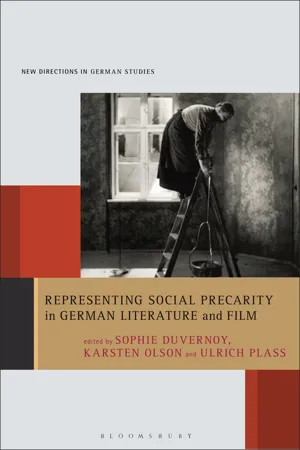
Representing Social Precarity in German Literature and Film
- 352 pages
- English
- ePUB (mobile friendly)
- Available on iOS & Android
Representing Social Precarity in German Literature and Film
About this book
Using Germany as a national case study, this volume examines the historical genesis of precarity, its evolution from 19th-century industrial modernity to the present, and its reflections and reconfigurations in artistic production, in particular with relation to work, gender, and sexuality. "Precarity is everywhere now, " sociologist Pierre Bourdieu declared almost thirty years ago. Not only declining middle-class standards of living, but also debt, drug addiction, housing and food insecurity, depression, and "deaths of despair" are now being recognized as symptoms of the downward pull of social precarity. Although these and similar ills have been attributed to neoliberal policies of deregulation, privatization, and willful neglect of the common good, precarization has accompanied the booms and busts of industrial modernity from its beginnings. Representing Social Precarity in German Literature and Film explores how German and Austrian literature, film, and social history have engaged with social precarity, from the period of Romanticism and early industrialization to the present. The chapters in this volume deal with precarity as both an objective phenomenon reflected in literary and filmic representations and as a subjective phenomenon that gives these representations their particular shape. Representing Social Precarity in German Literature and Film opens new critical perspectives on diverse forms of lived precarity and their creative manifestations by reflecting on the history of capitalist modernity from the vantage points of weakness, vulnerability, marginality, impoverishment, and otherness.
Frequently asked questions
- Essential is ideal for learners and professionals who enjoy exploring a wide range of subjects. Access the Essential Library with 800,000+ trusted titles and best-sellers across business, personal growth, and the humanities. Includes unlimited reading time and Standard Read Aloud voice.
- Complete: Perfect for advanced learners and researchers needing full, unrestricted access. Unlock 1.4M+ books across hundreds of subjects, including academic and specialized titles. The Complete Plan also includes advanced features like Premium Read Aloud and Research Assistant.
Please note we cannot support devices running on iOS 13 and Android 7 or earlier. Learn more about using the app.
Information
Table of contents
- Cover
- Title Page
- Contents
- List of Figures
- List of Tables
- Notes on Contributors
- Representing Social Precarity: Introduction
- 1 Literature and the History of Precarity: An Interview with Patrick Eiden-Offe
- 2 Precarious Property: Adam Müller’s Theory of Poetic Possession
- 3 Die Judenbuche and the Rights of the Poor
- 4 We Poor People: The Personal Experience of Precariousness in Dantons Tod and Woyzeck
- 5 Hilfe von Mensch zu Mensch: Social Precarity and the Elberfeld System
- 6 Precarity and Form: Lu Märten’s Intervention in the Worker’s Autobiography
- 7 In Search of a Divine Calling, or Lunch: Unproductive Labor in Emmy Hennings’ Das Brandmal
- 8 Typists as “billige Ware”: White-Collar Women’s Work in Weimar Literature
- 9 Unemployment, Organization, and Reproductive Self-Determination in Kuhle Wampe
- 10 “Hidden Stockpiles of Words and Images”: An Interview with Thomas Heise
- 11 Biopolitics and Superstition in Barbara Albert’s Böse Zellen
- 12 Precarious Lives and Social Decline in Marlene Streeruwitz’s Jessica, 30. and Kristine Bilkau’s Die Glücklichen
- 13 Linguistic Precarity in German Film: Discourses of Appropriateness in German Class and Welcome to Germany
- Index
- Imprint